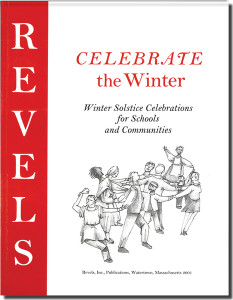 Jack here. I was down at Toad Hall listening to Brigid practice with the Quasimodal Orchestra, the busking/street theatre group she’s a member of. (Well, you didn’t think I was the only musician in me household, did you? Shame, shame if you did! I’m a fine fiddler and a decent dance caller, but me voice would curdle the milk of goats three meadows away, but hers is a very fine voice indeed.) They’re planning a Yule series of street ‘concerts’ based on Victorian street chants and the like. It should be quite interesting as they’ll not be dressed in Victorian garb, but rather all in contemporary punk-style black clothing. Their inspiration was, in part, Street Cries: A Collection of Dark Traditional Songs Reset in The Present Day… a collection put together by Ashley Hutchings.
Jack here. I was down at Toad Hall listening to Brigid practice with the Quasimodal Orchestra, the busking/street theatre group she’s a member of. (Well, you didn’t think I was the only musician in me household, did you? Shame, shame if you did! I’m a fine fiddler and a decent dance caller, but me voice would curdle the milk of goats three meadows away, but hers is a very fine voice indeed.) They’re planning a Yule series of street ‘concerts’ based on Victorian street chants and the like. It should be quite interesting as they’ll not be dressed in Victorian garb, but rather all in contemporary punk-style black clothing. Their inspiration was, in part, Street Cries: A Collection of Dark Traditional Songs Reset in The Present Day… a collection put together by Ashley Hutchings.
As a person deeply interested in winter and summer celebrations, it won’t surprise you that I collect books pertaining to the subject. After we reviewed the About Revels chapbook, Revels sent Green Man a copy of Celebrate the Winter: Winter Solstice Celebrations for Schools and Communities for review. Our editor kindly sent it to me to review. Being a fiddler does have its privileges! And this book certainly is a useful addition to our collection of similar materials such as Celebrating the Solstice and The Oxford Companion to the Year.
Following on the heels of Celebrate the Spring, Celebrate the Winter is Revels’ second volume of seasonal music, dance and participatory drama focused on helping schools and communities in presenting participatory winter solstice celebrations. Now I love the Revels; the Wild Hunt festival that I do annually has its roots in me seeing a Revels twenty or so years ago, and one might surmise that many of the festivals around North America owe their origins to the Revels in some fashion or another. The Winter Revels, which are the best known of these affairs, are simply, as the Revels Web site https://revels.org/ notes, ‘a celebration of the Winter Solstice — with traditional and ritual dances, processionals, carols and drama. For many, Revels answers that submerged yearning for ritual and for the markings of ancient landmarks in human life, which lie deep in us all.’ As author Susan Cooper says, ‘Revels productions show that all cultures throughout the ages are fed by the same great river of myths, story and song.’
Celebrate the Winter includes complete notes on the music, suggested dances such as The Abbots Bromley Horn Dance, and other neat stuff, including street cries and traditional singing games such as ‘There Was a Pig That Went Out to Dig’. An annotated bibliography has ample additional resources for you to check out. All in all, a worthy addition to the library of anyone actively involved in community-based rituals. And Revels gets a hearty slap on the back for expanding beyond its traditional English/French/Celtic fare to include material from other cultures — even if it is but one scant page!
What I’d be willing to say is that any community theatre group interested in staging a grassroots Winter Solstice celebration who have not done such an event before should get a copy of this publication. It’s less useful for any group that has already developed its own celebration. And the book, like Revels, is clearly intended for a mainstream audience; you certainly won’t find instructions on brewing your own winter ale here, or how to hold a true Scandinavian feast complete with a skald (historian, storyteller, poet and singer of songs).
Sigh. It’s quite good for what it does, but bloody ‘ell, Revels needs to be a bit more innovative than they apparently are! Me problem is that I know far more than’s good for me, so perhaps I’m judging Celebrate the Winter a tad unfairly. So if anyone knows of a Yule/Solstice Celebration book stronger on true Celtic and Nordic traditions, give me a shout.
Now where is that recipe for mead? Oh, Brigid …
(Revels, 2001)
